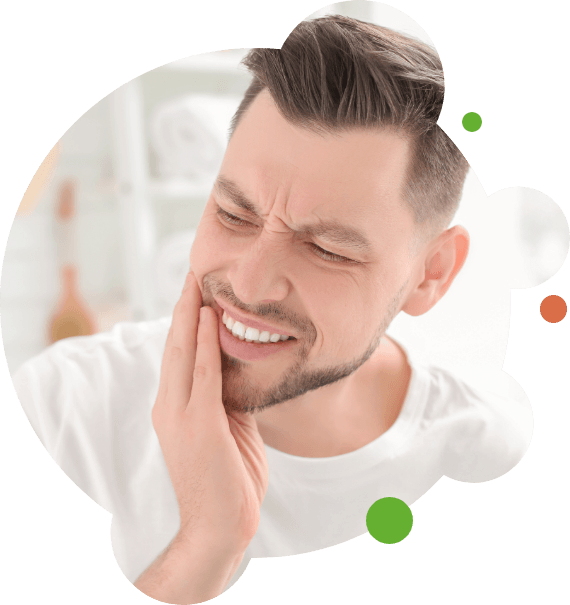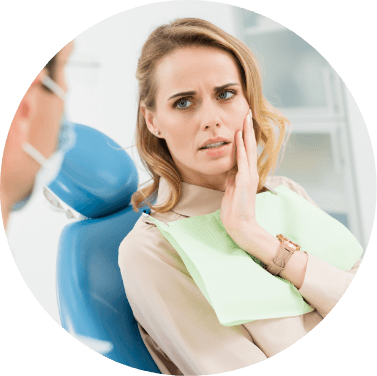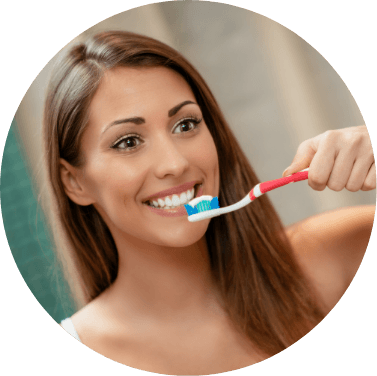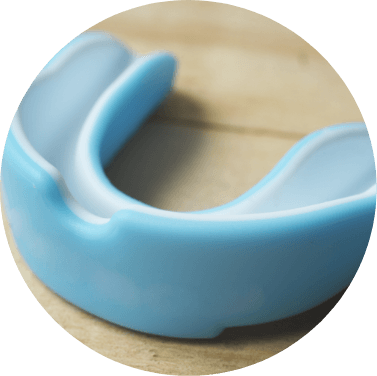Emergency Dentist Plano
Urgent Care Right
When You Need It
Everyone knows that the key to handling any kind of emergency is not to panic. However, that’s usually easier said than done. The solution, therefore, is to have a plan in place. If you are in the midst of a dental emergency, then the first thing you should do is call Plano emergency dentist Dr. Antoon. At a moment’s notice, Dr. Antoon and his team will be ready to help. If necessary, we can schedule an appointment immediately, because sometimes the difference between losing and saving a tooth is a mere 30 minutes.
To reach our office, call (972) 267-5000. One of our staff will be able to offer you advice on how to handle your particular emergency until you arrive at our office.
Why Choose Antoon Family Dental for Emergency Dental Care?
- Same-Day Appointments Available
- Evening and Weekend Office Hours
- Accepts Walk-Ins for Emergency Cases
I Need a Checkup & Cleaning I Need a Dentist for My Child I Have a Cavity or Broken Tooth I am Missing One or More Teeth I Want to Enhance My Smile I am Worried About Gum Disease I am Scared of the Dentist View Our Services
What To Do in a Dental Emergency

Our office will do everything possible to get you seen the same day that you call, so don’t hesitate to get in touch. In the event you can’t get to our practice right away, we do provide office hours on Saturdays, so you can schedule an appointment then. Our team members can also give first-aid tips over the phone to make your situation easier to handle until you arrive.
When you visit our office, Dr. Antoon will be able to determine whether or not the tooth can be saved. This exam will typically include a digital X-ray as well, especially if the emergency is not easily visible.
Dr. Antoon will then go over his findings, discuss which recommended treatment will be used to resolve your dental emergency, and make sure to get you out of discomfort before you leave. He’s happy to create a treatment plan and go over the details of it before you head out, including the length and estimated costs.
We’ll work as quickly as we can to get your oral health back in order, whether that’s through dental fillings, crowns, root canal therapy, tooth extraction, or something else.
The Most Common Dental Emergencies
Dr. Antoon and his staff are here for you no matter what your emergency might be. Whether you are dealing with a knocked-out tooth, a broken tooth, or a toothache, you can count on Antoon Family Dental to help. In the meantime, there are steps you can take to manage your emergency before you arrive. These can be found below!
Toothaches
Chipped
Tooth
Cracked
Tooth
Sensitivity to
Hot & Cold
Knocked-Out
Tooth
Lost Filling
or Crown
Broken
Denture
Loose
Tooth
Gums, Lip or
Tongue Injury
Jaw Pain or
Clenching
Something Stuck
Between Teeth
Understanding the Cost of Dental Emergencies

An unexpected dental emergency is stressful to handle, especially when you consider the impact it could have on your savings if you don’t have insurance. At Antoon Family Dental, we take pride in offering accessible, accommodating dentistry in your time of need. However, before we discuss the emergency dental visit cost, we’ll need to diagnose the underlying issue and put together a treatment plan.
Factors That Impact Emergency Treatment Cost

Before we put together a dental emergency cost, we’ll thoroughly examine your mouth. We typically take X-rays to view any hidden damage beneath the surface of your gums and conduct a visual inspection to diagnose the issue. Once we do, we can map out a treatment plan to help ease your discomfort and prevent additional issues from arising down the road. Some factors that can affect the cost of your visit include:
- The need for a follow-up appointment for additional services, such as a dental crown placement after root canal therapy.
- Dental insurance coverage that may include the treatment.
- The severity of damage that your mouth sustained.
Easy Ways To Pay

At Antoon Family Dental, we offer an in-office savings plan for patients who may not have insurance coverage. That way, you can get discounted prices for treatments and examinations. We are also an in-network provider with several dental insurance companies, including Aetna, Humana, and many others. For patients who don’t have insurance and would like to pay for their treatment in manageable installments, we also offer additional financing through CareCredit.
Committed To Affordable Emergency Dentistry

If you have any questions or concerns during your emergency examination, don’t hesitate to ask one of our friendly dental professionals. Our team is here to make your stressful situation easier to manage, which is why we’ll be more than happy to assist you with financing and dental insurance questions if you have them!
How to Prevent Dental Emergencies

You might never expect a dental emergency to interrupt your day, but they are more common than you might realize. Often, they occur suddenly and without any warning, like from an accident or injury. In other instances, they can be the result of an untreated issue that has turned into a big problem. Thankfully, there are several things you can do to help prevent an unplanned trip to your emergency dentist’s office.
Visit Your Dentist Regularly

The American Dental Association recommends everyone over the age of 2 visit their dentist at least twice a year for a cleaning and checkup. Your routine appointments are essential for maintaining a healthy smile. Your dental hygienist will remove any accumulations missed by your toothbrush and floss that can lead to common oral health issues, like tooth decay or gum disease. In addition, your dentist can monitor your dental health, which allows them to detect concerning areas while they are still small. Quick intervention prevents them from turning into a dental emergency down the road.
Maintain Good Oral Hygiene Habits at Home

The secret to a healthy smile starts at home to keep common issues at bay. It’s best to brush your teeth at least twice a day using a soft-bristled toothbrush and fluoride toothpaste. Clean all surfaces of your teeth and your tongue for at least two minutes. In addition to brushing, you should also use high-quality dental floss to clean in between each tooth and around the gum line before going to bed.
Stick to a Nutritious Diet

You’ve heard the saying, “You are what you eat,” but this applies to more than just your waistline. Your smile is also reliant on nutritious foods. It’s best to consume a balanced diet that contains lean proteins, low-fat dairy products, and fresh fruits and vegetables. We also recommend limiting your consumption of sugary foods and drinks to promote a cavity-free smile.
Wear a Mouthguard

Many unexpected dental emergencies are sports-related, like broken or knocked-out teeth. Many oral health emergencies caused by sports can be avoided using a simple piece of protection. A mouthguard provides a protective barrier to reduce the risk of injury to your teeth, gums, and jaw. Research shows it can also lessen the severity of concussion if there’s impact to the head.
A mouthguard can also be used to protect your teeth from the stress of bruxism. A nightguard creates a protective barrier between the upper and lower teeth to prevent damage caused by grinding and clenching, like worn enamel or loose teeth.
Use Tools, Not Teeth to Open Packaging

We’re all guilty of using our teeth as tools to tear open a bag of chips when scissors aren’t handy. While our teeth are convenient, it’s best to avoid using them to open packaging to prevent unnecessary dental emergencies. Instead, always get the right tool for the job to save your smile. Furthermore, you should break bad habits known for harming teeth as soon as possible, such as chewing on inedible objects like pens, pencils, or fingernails.
Dental Emergency FAQs
What’s Considered a Dental Emergency?
Pain and discomfort in your mouth can be relatively common, so how can you determine when it’s an emergency? If you notice the following signs, you likely have an emergency on your hands:
- Intense pain
- Bleeding
- Broken or loose teeth
- Knocked-out teeth
- Swelling
- Loose, broken, or dislodged crowns or fillings
- Sores or abscesses that won’t go away
Most dental emergencies come from one of two different categories: injury or infection as a result of poor oral hygiene. At Antoon Family Dental, we are more than ready to treat both!
When Should I Go to the Emergency Room vs. the Dentist?
If your dental emergency is life-threatening, then you should go to the hospital instead of your emergency dentist. Issues like uncontrollable swelling that hinders your breathing, jaw fractures, deep cuts, jaw dislocations, and serious abscesses or infections all require an immediate visit to the ER. For any other dental emergency or infection that isn’t affecting your breathing, call and schedule an appointment with us instead.
Will I Need a Root Canal?
Root canals are one of the most common treatments for severe toothaches. When decay or injury reaches the sensitive inner portion of the tooth, where nerves and blood vessels are housed, it causes extreme pain. One of the best ways to relieve that pain is with root canal therapy, where we remove the damaged nerve from the tooth so that you no longer feel pain there. If your toothache is severe enough, root canal treatment may be necessary.
How Long Should I Wait for Emergency Treatment?
Ideally, you should call us immediately if you have a dental emergency. Unlike general medical conditions, which often get better on their own with time, dental problems worsen the longer you leave them alone. Additionally, if you have knocked out a tooth, then time is of the utmost importance, as you have less than an hour to successfully reattach the tooth. Since most dental emergencies have pain associated with them, it’s a good idea to seek treatment as soon as you possibly can. Give us a call as soon as you experience a dental problem.
Will My Insurance Cover Dental Emergencies?
It’s difficult to estimate your coverage because there are so many different kinds of dental emergencies, and even more kinds of insurance plans out there. Treatments for dental emergencies vary greatly, so your insurance may cover treatment, while it’s also possible that it doesn’t. For example, your insurance is very likely to cover the majority of minor restorations like fillings, while they are unlikely to cover more than a minor portion of major restorative procedures like tooth replacement with dental implants. However, don’t worry. Our friendly and helpful team will be more than happy to work with you to file your insurance claims to maximize your plan’s benefits and minimize your out-of-pocket costs.
Will My Toothache Go Away on Its Own?
Toothaches don’t usually go away on their own. Because of this, it is best to schedule a checkup with a dentist to ensure that nothing is wrong. There are a variety of potential causes for a toothache, and you will want to rule them out with a professional as soon as possible. Doing this can help you catch underlying issues before they become serious.
How Should I Sleep with Tooth Pain?
It can be difficult to get quality sleep when you’re dealing with a toothache. Until you can see an emergency dentist in the morning, keep your head elevated. This will help to prevent blood from rushing to your head and intensify your toothache. Additionally, take over-the-counter medication as needed and avoid foods that are particularly acidic, cold, or hard before bed. Cold compresses can also help to dull your discomfort.
Should Knocked-Out Teeth Be Placed in Water?
Water can be used to rinse a tooth, but the tooth itself should not be placed in water. Water can damage the root surface cells of the teeth, reducing the chances of it being able to be placed into the socket. Instead, do your best to place it back into your open socket yourself. If you can’t, place it in your cheek or a container of milk, saliva, or saline solution and head to an emergency dentist immediately.
Can I Pop a Dental Abscess on My Own?
You should never attempt to pop a dental abscess on your own. Instead, always get in touch with a dentist. A tooth or gum abscess is considered a dental infection and therefore an emergency. Popping the abscess will only expose your mouth to more bacteria and cause additional irritation. Putting off treatment can allow the infection to spread to other areas of the mouth and the rest of the body, causing additional problems.

